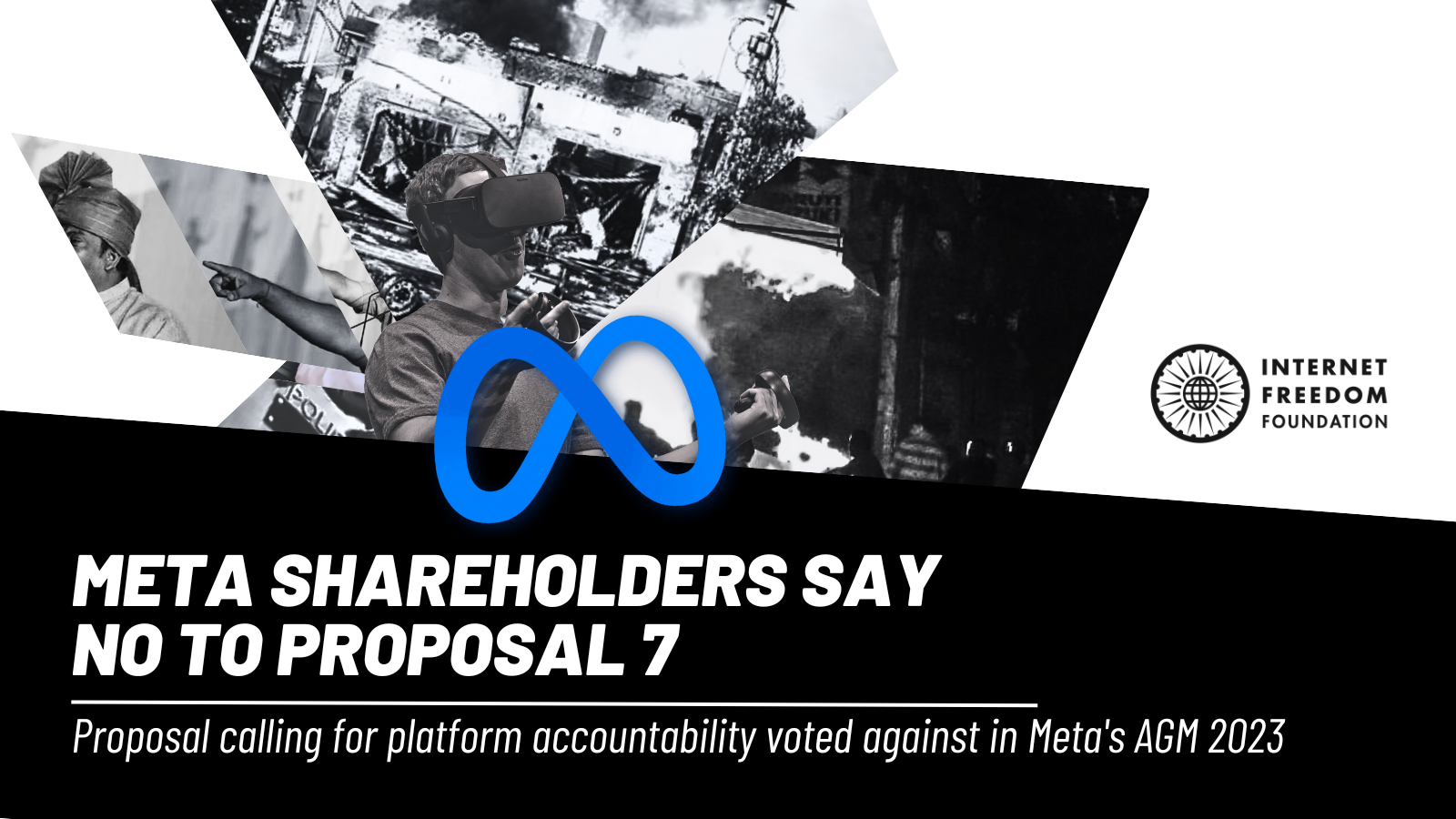
tl;dr
Meta shareholders voted on Proposal 7 at the Meta Annual General Meeting (AGM) on May 31. As per the preliminary voting results, Proposal 7 did not garner enough support from the shareholders and thus, the outcome was not in its favour. As the voting concluded, so did the 6 day joint campaign launched by Ekō, India Civil Watch International (ICWI), and IFF. However, our efforts towards demanding accountability from Meta for its actions and their implications in India does not end here.
Why should you care?
Proposal 7 titled “Assessing Allegations of Biased Operations in Meta's Largest Market” highlights allegations against Facebook for disseminating hate speech, its failure to address risks and political bias, and voices concerns around inadequate content moderation and lack of transparency in platform practices. Proposal 7, the only one out of the 13 proposals with a direct reference to India, and its voting outcome carried immense significance for the Indian audience. The voting outcome for Proposal 7 is a loss in the fight for human rights from companies like Meta whose action (on inaction) have real life implications.
Campaign #VoteForABetterMeta
Ekō, ICWI, and IFF jointly launched a campaign to raise awareness about Proposal 7, and the concerns highlighted therein, among users of Meta platforms, with the aim of urging shareholders to vote in favour of Proposal 7 by May 31. Our outreach to journalists and civil society organisations, included a press release on May 26, which reiterated concerns highlighted in the proposal and emphasised the need to urge the shareholders to vote in favour of Proposal 7.
We would like to thank all the journalists and reporters who reported on Proposal 7 and contributed in raising awareness around it (a list of mentions in the media about Proposal 7 may be found here). The proposal was also supported by Glass Lewis, a leading advisory service which manages more than 40 trillion in assets and provides institutional investors with guidance on resolutions.
In the days leading up to the meeting, civil society organisations including IFF used social media channels to highlight instances where Meta failed to address critical issues effectively (See more about the campaign on social media, identified by #7ReasonsForProposal7, here).
On May 26, we hosted an AMA on Reddit where Apar Gupta, Founding Director, IFF and Maen Hammad, Tech Accountability Campaigner, Eko answered questions regarding Meta’s inaction to address critical issues such as political bias, hate speech, misinformation, et cetera in India, the Meta AGM, Proposal 7, effectiveness of shareholder activism, the voting process in shareholder meetings, etc.
AMA: Facebook-Meta has been accused of failing to take action on hate speech in India. We’re asking its shareholders to hold Meta accountable. Apar Gupta, Founder-Director, IFF and Maen Hammad, Tech Accountability Campaigner, Eko to answer your questions.
by u/InternetFreedomIn in india
An audio recording of Apar Gupta’s statement was played live during the Meta AGM on May 31 to present Proposal 7 to the shareholders. For wider reach, IFF published a video of Apar Gupta advocating for a vote in favour of Proposal 7 on the same day of the meeting.
The (preliminary) results are in!
Meta shareholders voted against Proposal 7, an outcome in line with the recommendation of Meta’s Board. As per the preliminary voting results, the proposal received 5% votes in favour and 95% vote against. These are not the final numbers and they will only be released in the coming days when Meta submits their final vote tally. The results, while disappointing, are not surprising. The resolution calling on Meta to release its India HRIA report and conduct a study on political bias of its algorithm did not pass due the governance structure of the company with a majority of shares owned by leadership.
This unequal governance structure may be explained by “dual-class” shares. This refers to an unequal share structure in which Meta founder Mark Zuckerberg along with other members of senior management own a majority of voting shares. It is due to these dual-class shares that resolutions cannot receive majority votes in favour by itself unless it is approved by the aforementioned few with ‘super voting’ abilities. Notably, the dual-class share structure draws a lot of frustration, not just from civil society, but even from large pension funds.
Apar Gupta, in his pre-recorded audio presentation to the shareholders, stated, “Although dual class shares make it impossible to secure a majority of votes, let it not prevent you from hearing the call of your conscience for the people of India”.
Nevertheless, in case a proposal obtains even a significant minority of independent shareholder votes, it sends an important and strategic message highlighting shareholder discontent. This has resulted in positive outcomes before and is an important crux to these sorts of campaigns. For instance, Ekō had submitted shareholder resolutions against Apple demanding transparency regarding its efforts to protect workers in its supply chain from forced labour. After effective engagement with the company through several resolutions and a growing number of shareholders voting in favour, Ekō was able to get the company to take action.
“Shareholder resolutions rarely win a majority vote – and never can gain a majority at a company like Meta which has a “dual share” structure. That means every vote controlled by Mark Zuckerberg and a small circle of allies is worth 10x of normal shareholders. Despite this significant disadvantage, our resolution received 5% support which equates to approximately 17% of the independent vote from shareholders. This is a very good showing for a first filing and meets the threshold for future refiling. It also signals to the company’s Board that a credible percentage of shareholders are deeply troubled by Meta's human rights track record and allegations of political bias. As India prepares for the world's largest democratic election, it is imperative that these concerns are given due consideration."
-Christina O'Connell, Ekō
Not the end, just the beginning
The broader aim of such shareholder campaigns is not necessarily to “win” but instead to initiate a conversation, engage with the company’s senior management, and remind shareholders what it is that we need to demand. Shareholder activism/ advocacy is an extremely effective tool to hold businesses/ companies to account and put significant pressure on them as these resolutions can mobilise shareholders. Even with dual-class shares, votes casted in favour of the proposal by independent shareholders work well in communicating shareholder discontent and thus also works as momentum to get the company to act.
The repercussions of Proposal 7's defeat are far-reaching, particularly impacting Meta users in India and the imperative to uphold human rights commitments. But the broader campaign of seeking accountability and transparency from such platforms doesn't end here. Keeping the 2024 general elections in mind, we wish to continue putting significant pressure on the companies such as Meta and continue our efforts as part of a broader campaign with the aim of safeguarding elections and democracy from misuse of social media platforms. On the HRIA in specific, we stand by the demand for its full and immediate release. We are motivated to hold Meta to account and protect our democracy going forward.


